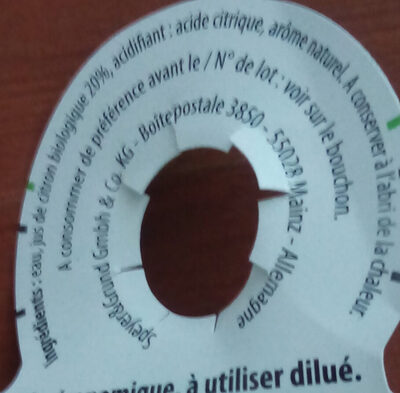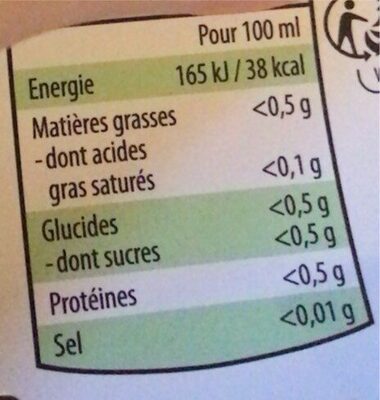Jus de citron biologique - SIMPLEMENT BON ET BIO - 200 ml
Ambiguous barcode: This product has a Restricted Circulation Number barcode for products within a company. This means that different producers and stores can use the same barcode for different products.
×
Barcode: 26001142
Common name: Préparation à base de jus de citron biologique
Quantity: 200 ml
Packaging: fr:Bouteille en plastique
Brands: SIMPLEMENT BON ET BIO
Categories: Plant-based foods and beverages, Beverages, Plant-based beverages, Fruit-based beverages, Juices and nectars, fr:Nectars de citron
Labels, certifications, awards:
Organic, EU Organic, Non-EU Agriculture, DE-ÖKO-060, EU Agriculture, EU/non-EU Agriculture, Green Dot, AB Agriculture Biologique


Origin of ingredients: Germany
Stores: Aldi
Matching with your preferences
Report a problem
Data sources
Product added on by sebleouf
Last edit of product page on by chevalstar.
Product page also edited by aleene, benbenben, beniben, date-limite-app, ecoscore-impact-estimator, kiliweb, moon-rabbit, oliviers, openfoodfacts-contributors, packbot, quechoisir, roboto-app, roro59720, segundo, yuka.R1prUU42c0hxOFk3aE1BZDBnei8ybzVyMzUyYkJEeWRCdUFjSVE9PQ, yuka.RzVnaU5JTmR1ZlFFdnZZUDNUQ0U5Y2xibHIrRGNHTzRDdXNRSWc9PQ, yuka.UTRVdU5vMHZnL0FScDhRbTNoUGI0OHB0KzVLaVhET2xHODBPSWc9PQ, yuka.sY2b0xO6T85zoF3NwEKvlkFfXoLhiBj_KCXVllyn1vWMNrLZSPFR5Nb1Nag, yuka.sY2b0xO6T85zoF3NwEKvlkxaTuLwmiLGNAT6x2CR7--MI5bJZOEuwIfiaqs, yuka.sY2b0xO6T85zoF3NwEKvllZia_rsrCvYJSXSgVOtnNiSd8DjSOFZuNTxNag.













